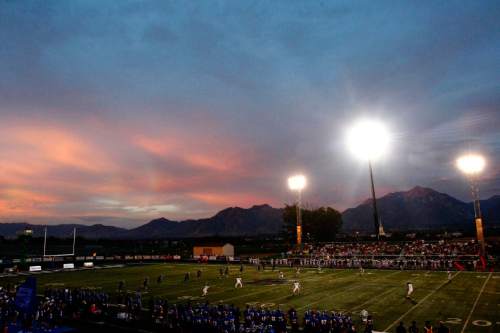This is an archived article that was published on sltrib.com in 2016, and information in the article may be outdated. It is provided only for personal research purposes and may not be reprinted.
A head-to-head matchup is brewing between the Utah Board of Education and the state's governing body over high school athletics.
School board members are scheduled to discuss a new policy Thursday that would negate the eligibility restrictions for student-athletes who transfer schools — meaning a student who practices with the Bingham Miners on Monday could score a touchdown for the Lone Peak Knights on Friday night.
Eligibility restrictions traditionally are set by the Utah High School Activities Association, or UHSAA, which sanctions extracurricular programs at public and private high schools.
But if approved, the board's policy would prohibit public schools from participating in UHSAA unless the association drops its restriction on team transfers.
"They would either have to change their rules, or public schools wouldn't be able to participate in their association," school board Chairman David Crandall said.
UHSAA's executive director, Rob Cuff, said the association has not taken a formal position on the board's proposal.
But he added that the prohibition on transfer requirements could "open the floodgates," creating scenarios in which a student switches schools for each varsity sport or jumps to a new team on the eve of a championship game.
"There's not a state in the whole nation that doesn't have a transfer rule," Cuff said. And failure to comply with the board's policy would potentially cost the association 89 percent of its member schools.
"That would be doing away with the UHSAA, I guess," he said. "Or it would be a private-school league."
The policy would also give the state school board authority over athletic conference designations.
"If an association rules against a school in an appeal regarding a change in conference classification," the policy states, "the school may appeal the association's decision to the board, whose decision shall be the final determination in the matter."
Crandall said the policy stems from several concerns, including the recent denial of reclassification for Mountain Crest High School — which had requested to move from 5A classification to 3A after its enrollment dropped — and the ongoing issue of students being denied athletic eligibility after transferring schools.
Utah law allows students to enroll in any school with available room, independent of community boundaries.
But once a student-athlete transfers to a new school, UHSAA decides whether the student may compete in sports, based on whether the transfer was due to hardship, family relocation or other exceptions.
The waiver process can be arbitrary, Crandall said, and it's unclear which standard UHSAA uses to determine who does and does not have eligibility to participate.
"That seems to be inconsistent with students' and parents' right to choose which school they want to attend," Crandall said. "They're treated differently at their new school because of the fact that they are a transfer student."
In addition to his role as school board chairman, Crandall serves on the governing board of Summit Academy, a Draper-based charter school whose football program received multiple sanctions in May for violating UHSAA recruiting rules, including a postseason participation ban that was later overturned on appeal.
Crandall said the school board's policy is not intended to benefit or respond to any individual school.
"It's not anything that would be unique to charter schools or Summit Academy," Crandall said. "It's something that would apply equally to all students in all public schools."
UHSAA would be free to restrict inappropriate recruiting under the policy, Crandall said, which would apply to coaches, administrators and school staff.
"If there are problems with adults misbehaving," he said, "that's where their attention should be focused."
Juab School District Superintendent Rick Robins said eliminating UHSAA's transfer rule would open the door to student recruiting by making it easier for athletes to enroll in more-attractive programs.
Robins played football for Southern Utah University and has coached high school athletes.
He has, at times, been a vocal critic of the UHSAA, he said, but the association's transfer rules help to level the playing field between urban and rural communities.
"As a rural athlete myself, I wouldn't have had the opportunities I had unless there were protections in place," he said. "We'll end up creating a vacuum of elite megaschools and -teams."
He said he supports the rights of parents and students to choose the best academic and athletic fit for their family. But the school board's proposal, he said, goes too far.
"We already have open enrollment in place," he said. "I don't see the need to add another layer to this."
The school board also is scheduled to discuss amendments to an existing policy that would substitute specific references to the UHSAA with more general terminology.
Crandall said those changes are being made to avoid the appearance of favoritism, and not in anticipation of a rival activities association supplanting UHSAA in the state.
"We try to avoid naming private organizations," he said. "The Legislature doesn't do it in legislation — we try not to do it in rule."
The new policy and the amendments are scheduled to be heard Thursday by the board's Standards and Assessment Committee.
Pending action by that committee, the two issues will be discussed by the full school board Friday.
Board member Linda Hansen said she has received relatively little feedback on the proposals, which she attributed to a lack of public awareness.
She acknowledged the concerns of some board members regarding athletics in the state, but she added that she'd prefer additional input from students, parents, coaches and the activities association before voting on new policy.
"Those things can be worked out," she said. "That's my big concern — that before we start making rules that we actually talk to people and work things out."
Twitter: @bjaminwood



